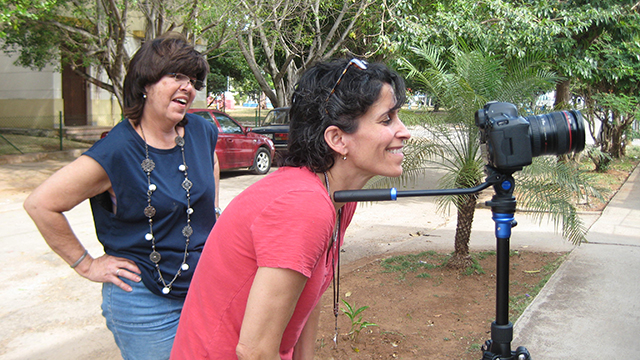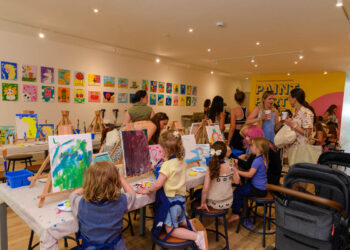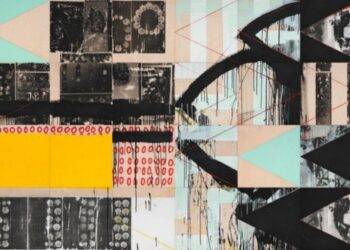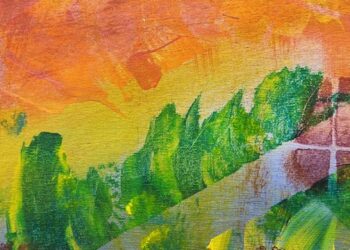For filmmaker Christiane Arbesu, a 2016 trip to Cuba was about so much more than a typical international expedition offers. Arbesu’s father, the first Cuban ambassador to Indonesia, mother and three sisters sought political asylum in Canada in 1962 and lost touch with loved ones in their homeland. Arbesu’s first journey to Cuba served as a chance to learn more about her heritage and meet her extended family, some of which she didn’t even know existed.
This incredible experience is documented in Arbesu’s I Am Arbesu.
We had a chance to speak with the filmmaker – who resides in Hampton Bays – about the inspiring story, how family transcends all, and more.
How did the journey to make this film first start?
CA: I’ve always wanted to go to Cuba to meet my family and I couldn’t go because I’ve been living in the States. After university, I moved to New York City full-time. I was too afraid to go through Canada or through Mexico, because then the American government could find out and I could potentially lose my green card status here. When I became an American citizen 12 years ago, it wasn’t legal to go. Once Obama opened doors with Cuba in 2016, I realized this is the perfect opportunity for me. I ended up being able to go and actually one of my sisters started communicating with Mimi, who’s one of the main characters in the documentary. That’s how it all turned out. She was the first cousin I met and then she introduced me to the entire family over there.
Prior to leaving, how many family members were you aware of and planning on meeting?
CA: You know what? I had no idea. Mimi would send me a couple of pictures of our family. But, it’s so hard when you don’t know the people. I couldn’t keep track. I absolutely had no idea that there were that many. I mean, I knew about my cousins, but I didn’t know about their children. And my dad’s cousin. It just kept growing. I had no idea that my mother’s brothers were alive. No idea.
How many did you end up meeting?
CA: At least 20 – 25.
 |
|
Christiane with Conrado (right). (Courtesy Photo) |
How long were you there for?
CA: I’ve been there about seven times. For the first time, the first trip, because I was filming, it was 21 days. The second trip was two weeks and I’ve always stayed there for at least two weeks. And I went for Mimi’s birthday as a surprise. Work was so crazy so I just went there to surprise her for her 65th birthday and was there for just a few days. And then Mafo died, my uncle through marriage, and I went to pay my respects for two days. All of the older people in the film have passed away. I made my film just in time.
What was your reaction upon landing in Cuba and meeting your family for the first time?
CA: It was so overwhelming. The first family member that I met was Mimi and her husband and her daughter, and it was as if we’d known each other forever. There’s a scene in the film where she’s been in the car and I’m like, “All you do is cry.” Because that’s all she does. She cries about everything. It’s just remarkable. We’d only known each other under 24 hours, that was the next day. So, it was such a familiarity. When I met all the other family members, of course, I was really nervous because I’m thinking, you know, my dad left. He left the communist regime, he was quite high up in the Cuban government. He was Fidel Castro’s right hand man. Like Mimi says in the film, they were waiting in 1962, they were waiting for him to come home. It was all over the news. They actually showed a clip of my dad on the television in Cuba while I was there, but I missed it. They rerun all the propaganda of how great the revolution was. I was always quite reticent that there would be issues like I’m a traitor, I’m the daughter of a traitor. Not at all, it was the complete opposite. The older people are more blinded, but they see that the country’s pretty much fallen to pieces. There’s not a lot of food. It’s very different. It’s very difficult to navigate in Cuba. The infrastructure is falling apart.
But, it was just love and I think you heal after 56-57 years. I think even had I gone years earlier, I think it would have been the same. Family transcends pain and there were so many similarities that we have. It’s unbelievable. I guess it’s just genetics, just even down to the fact that we all have dachshunds, we like to sing. They would say to me, “Oh, my god, you’re just like our grandmother.” I wish I could have met her. I never knew my grandparents at all.
So, on the one hand, of course it was so profoundly beautiful and just incredible. I’ve never felt love like that, because it was love magnified a million times, because there’s so many people. Each cousin was just sweeter and nicer and kinder than the next one. I mean, I loved all of them. You just love them right away. It’s like this overwhelming force and sense of love. And then it’s so sad, because we did lose so much time, but at least we’ve got the rest of our lives. Although it’s challenging. The Internet is so hard. I can’t just pick up the phone and call them. We do WhatsApp, but it freezes and so I buy a calling card which costs me $1 a minute to talk with them. I try to do that once a week.
But, I feel that it’s a gift. It’s like my whole world has opened up. I never had family. I only knew my sisters, my brother and my parents. And I knew my mother’s sister and her son and one uncle. That’s it.
 |
|
Mimi and Christiane behind the camera. (Courtesy Photo) |
What do you hope people will take away?
CA: There’s two things. One of them is to try not to let political views cloud feelings for family, that’s so important. It’s so important to just really honor your family and your roots and it’s so good to know where you come from, because there’s a part of you that lives in all of them. You all share the same genes and the same makeup.
The other thing is that people are always saying how they really want to go back and find out where they’re from. Just do it. Life is too short and it’s something that you won’t regret.
A lot of people that have seen my film, even some that I don’t know, when I did a couple of screenings, have come up to me and said, “Oh my God, it’s totally inspired me. I want to go to my homeland.” I’ve got friends from all over who have said “You know what? I’m gonna call my mom tonight and tell her how much I love her.” Because it’s so fleeting, but we’re all connected.
Where can people see the documentary?
CA: I’m trying to get a screening in the Hamptons, but, right now, it lives on the LTV website, LTVEH.org, in the video on demand portal.
What are you working on at the moment?
CA: I’m starting to work on a documentary on Holocaust survivors. It’s been hard because of the pandemic. I have two friends, one is a survivor of Polish descent whom I’ve known for 35 years, she’s actually my neighbor. She lost her entire family in the camps when she was about six years old. And the other one is of German descent. The woman of German descent started a school 56 years ago in New York City for children with learning differences. And I just met someone who was in a detainee camp. She was born in Germany; her parents were both Holocaust survivors. I think I’ve got a really good story with their combined experiences. I’m just in the beginning phases.
I’m currently filming my friend who’s dying – stage four pancreatic cancer, was diagnosed in June. She wanted me to document her journey. It’s quite powerful.
I also produce medical videos. Topics include ADHD, migraine, various maladies, treatments, interviews with doctors and patient testimonial videos. I also do work for nonprofit organizations. I’ll be producing another gala for The Ellen Hermanson Foundation. I produced Southampton Hospital’s virtual summer gala this year and one for Ellen Hermanson. Both went really well, so I’m happy with the way they turned out.












